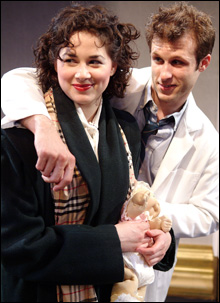Gloucester Stage honors Wendy Wasserstein
By CAROLYN CLAY | June 20, 2006

A LITTLE DATED: But Wasserstein’s generous and bubbly spirit transcends cliché. |
It’s particularly piquant to revisit The Heidi Chronicles (at Gloucester Stage Company through July 2) following the death in January of its author, 55-year-old Wendy Wasserstein, who was gypped out of what should have been the rest of her life. The heroine of her Pulitzer-winning 1989 play feels gypped too — though out of her 1960s hopes, not her very existence. Like many women of Wasserstein’s generation, I have a somewhat excruciating fondness for this play. (It is not easy, if you were there, to watch a parody of 1970s female bonding in which the hugging, gushing bonders are a law student, a militant lesbian, and “a fuckin’ Hostess cupcake,” all women, hear them roar.) But unlike Tony Kushner’s Pulitzer winner, Angels in America, which is also anchored to the 1980s, The Heidi Chronicles shows its age. It is very much reflective of a first feminist generation of women caught between what their mothers had taught them to desire and what they thought they wanted. Given that, there is behind the play’s parodic topicality a depth and sincerity missing from, say, Wasserstein’s posthumously published first novel, Elements of Style. The difference is that in Elements of Style Wasserstein, aiming for The House of Mirth but achieving The Nanny Diaries, lampoons the soulless core of myopic, fabulously rich if endangered post-9/11 New York society. In The Heidi Chronicles, even when she wields a broad brush, she’s painting herself.Heidi Holland is an art historian with an excellent education and a teaching gig at Columbia. The play begins with a lecture in which, abetted by slides and fielding the combination of intelligence and self-depreciating humor that’s Wasserstein’s trademark, Heidi champions marginalized women artists through the ages. The comedy then flashes back to a 1965 high-school dance, marching forward from the idealistic ’60s to the Reaganomic ’80s to chart the disappointed evolution of “true believer” Heidi, who at the play’s climax gives a speech to fellow alums of “Miss Crain’s School” in which, overcome by a vague sadness, she wonders where feminism has gone, to be replaced by female competition and self-absorption. “It’s just that I feel stranded,” the vulnerable PhD concludes. “And I thought the whole point was that we wouldn’t feel stranded. I thought the point was that we were all in this together.” On the cusp of the ’90s, when the play (starring Joan Allen) enjoyed an 18-month run on Broadway, this struck a chord that now sounds a little distant and brassy. But suffused with the generous and bubbly spirit of Wasserstein, the play retains a warmth that transcends cliché.
At Gloucester Stage Company, director Eric Engel forges boldly into memory lane, waving musical banners that quickly flap from “The Shoop Shoop Song” to Janis Joplin (that’s got to be a good transition, right?) as Heidi moves from bookish teen to “neat and clean for Eugene” and we meet the people who will be touchstones in her life: school chum Susan, who’s all melty for a lad who can twist and smoke at the same time but who will evolve into a “radical shepherdess counselor” and then a Hollywood power broker; future “leading pediatrician in New York under 40” Peter Patrone, who will disappoint Heidi by being gay (and, in his last scene, muffle her individual melancholy beneath the blanket of AIDS); and overachieving, not entirely irredeemable philandering jerk Scoop Rosenbaum, who turns up like the bad penny Heidi can’t resist pocketing.
 Related
Related:
Wendy Wasserstein,1950–2006, War games, Clever or klepto?, More 
- Wendy Wasserstein,1950–2006
Wendy Wasserstein, who died Monday of lymphoma at the age of 55, was a successful, committed commercial playwright — Lillian Hellman with a sense of humor.
- War games
Wendy Wasserstein might have chosen a lesser light in whose shadow to cast a play than King Lear .
- Clever or klepto?
A certain branch of modern liberal academia could stand a little likening to Lear, as stubbornly entrenched in its own theories, deconstructions, and Weltanschauungen as it is.
- Flashbacks: March 3
These selections, culled from our back files, were compiled by Chris Brook and Jessica McConnell.
- Jailed HIV-positive pregnant woman released - for now
Quinta Layin Tuleh, the HIV-positive pregnant woman a federal judge in Bangor, Maine, ordered jailed until her baby was delivered, has been released on bail while her appeal of her sentence makes its way through the courts.
- Parental discretionary donors
Polarizin’ Palin has people everywhere opening their pocketbooks to the pro-choice movement’s benefit.
- Prudish publication makes its debut
You won’t see any bikinis in Eliza’s swimsuit spread, just one-pieces and a few belly-covering tankinis.
- Auteur of Africa
What I admired most about Ousmane Sembene was his courageous, lifetime commitment to women’s rights.
- Brain gloss
The merger of thought and glossy spreads of girls in streaming, DIY couture.
- Saluting the enemy
Last week we republished Anita Diamant's 1981 report on the showdown between Alan Dershowitz and feminist anti-porn crusader Andrea Dworkin. This week, Dershowitz responds.
- ID Check: Chelsea Spear
Chelsea Spear grew up in Medford, back when it was strictly a working-class enclave known largely for “big hair, Spandex, and KISS-108,” so she understands the injuries of class.
- Less

 Topics
Topics:
Theater
, Janis Joplin, Special Interest Groups, Women's Issues, More  , Janis Joplin, Special Interest Groups, Women's Issues, Joan Allen, Marianna Bassham, Tony Kushner, Wendy Wasserstein, Heidi Holland, Eric Engel, Anne Gottlieb, Less
, Janis Joplin, Special Interest Groups, Women's Issues, Joan Allen, Marianna Bassham, Tony Kushner, Wendy Wasserstein, Heidi Holland, Eric Engel, Anne Gottlieb, Less 